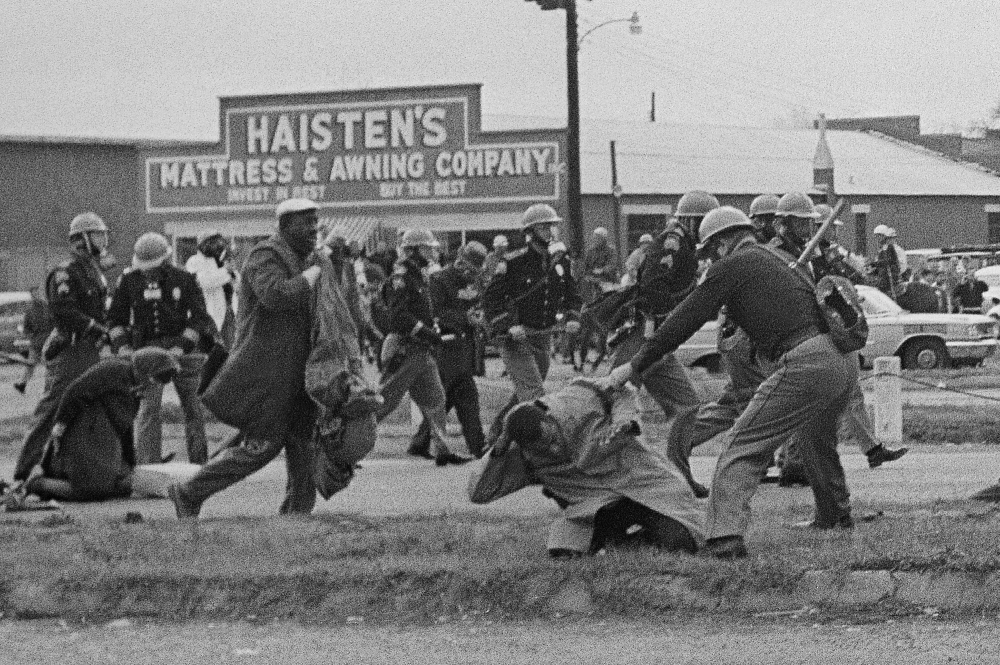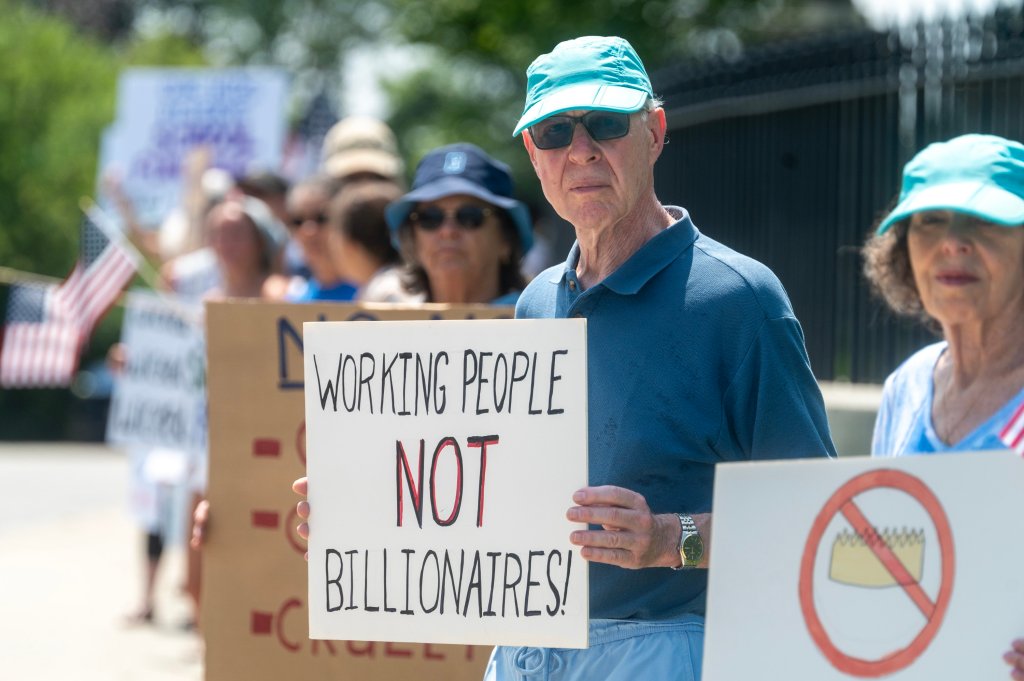Freeport’s “good trouble” demonstration Thursday morning was deeply personal for Anna Brown’s family.
Her contract working on climate adaptation projects for the U.S. Agency for International Development was canceled recently after the Trump administration defunded and dismantled about 80% USAID’s staffing and foreign aid programs.
Brown, her husband, Colin Cheney, and their two children were among about 150 people who demonstrated along Main Street in honor of the late Rep. John Lewis, D-Georgia, a civil rights icon who died July 17, 2020. Participants carried signs saying “Liberty & Justice For All,” “Stop the Lies” and “Save Our Democracy.” Some displayed U.S., Canadian and Ukrainian flags. Passing drivers honked their horns and waved.
“We have to stand up and do our part and make good trouble, like John Lewis said,” said Brown, a Freeport resident who has joined weekly protests against the Trump administration since March. Other Maine communities have been holding marches and rallies for the same purpose.
The protest in Freeport was among hundreds planned in communities across Maine and the country Thursday by a coalition of advocacy organizations. The name “good trouble” comes from Lewis’ frequent call to nonviolent protest. Other Maine cities and towns where events were scheduled included Norway, South Paris, Bridgton, Farmington, Auburn, Augusta, Belfast, Brunswick, Calais, Eastport, Houlton, Machias, Portland, South Portland, Rockland, Wayne, Wells and York.
Brown, 46, and her son Eamon, 10, both wore tricorn hats purchased on a recent visit to Valley Forge, Pennsylvania, where they learned about the rough circumstances that American patriots faced in the fight for independence. He carried a sign with a Lewis quote: “Freedom is not a state. It is an act.” Brown’s daughter Mirabelle, 13, held a sign showing a forest in flames.
“I’m here because of everything that’s happening with the Trump administration,” Mirabelle said. “All the fires and floods and other problems because of climate change, and the ICE sweeps and deportations and shutdowns and the unfairness of it all.”

One of the original Freedom Riders and a contemporary of Martin Luther King Jr., Lewis was beaten by state troopers when he led the first march from Selma to Montgomery, Alabama, in 1965. Shortly before his death, when he crossed the Edmund Pettus Bridge again in 2020, Lewis urged people to “get in good trouble, necessary trouble, and help redeem the soul of America.”
“John Lewis is an inspirational figure in all of this,” said Kathleen Meade, 76, an organizer of Visibility Freeport, a group that has been demonstrating weekly against the Trump administration’s actions and policies since March. Held every Tuesday from 8-10 a.m., the events draw 50 to 60 protesters from the area.
Dory MacKinnon, 63, of West Bath, was one of the first protesters to regularly stake out the intersection at Main and School streets in Freeport last winter. It’s a spot in front of St. Jude’s Catholic Church where the Freeport Flag Ladies stood for nearly 20 years after the 9/11 attacks. Holding a sign saying “Protect Federal Workers,” MacKinnon stood alone in the cold for about an hour before others joined her.
“I came down here in February because I was so angry about what was going on in our country,” she said at Thursday’s protest. “I got a lot of honks and waves and it made me feel like I wasn’t alone.”
When Lewis died, MacKinnon said, the nation lost an unwavering activist who fought for equity that is now under attack.
“He was beaten yet he continued to fight for what he believed in,” she said. “I can certainly stand here for a couple hours to let people know we stand up for equality and democracy and for those who can’t stand up for themselves.”
MONUMENT SQUARE PACKED
The Ideal Maine Band was the opening act for Portland’s ‘good trouble’ on Thursday, with a few hundred gathered with their signs hoisted high to soak in the fanfare.
By the official start time of 6:30 p.m., that number swelled to over a thousand and, after another 15 minutes, closer to 2,000 as more people kept trickling in to join in on chants and listen to speeches. And there always seemed to be a passerby honking their horn. Some of the drivers even waved American flags and protest signs of their own.

Debra Bellare of Indivisible Greater Portland, the group that organized Portland’s rally, said a focus of the demonstration Thursday was on voting rights. The group and many demonstrators, judging by cheers and some signs, displayed their opposition to the upcoming statewide referendum in November that, if approved, that would change election laws in Maine, including requiring photo identification to vote.
“We’re speaking out against what’s happening; the trampling of our human rights, civil rights and voting rights,” Bellare said.
Talia Pyzik of Indivisible Greater Portland said while that’s a focus, there are many things ralliers stood up for on Thursday, from health care and education to public television and radio.
“We are here to stand up and shout out our support for all the civil rights issues that John (Lewis) fought for and other civil rights activists fought for,” said Talia Pyzik of Indivisible Greater Portland. “There’s been a little bit of progress, but now with the Trump regime, we have gone many, many, many steps back.”

KEEPING IT CIVIL IN AUGUSTA
At the demonstration in Augusta, as a gray pickup truck curved around the State House, a bearded man in a red bandana leaned out the passenger window, propping himself up by his elbow. He started to yell toward the more than 400 protesters lining the sidewalk.
“If you’re not a natural American citizen, don’t …” The truck sped southward and the man’s voice trailed off. Not one protester replied.
That kind of silent defiance was the entire purpose of the protest, Indivisible Mid-Maine organizer and former Colby College professor Elizabeth Leonard said. The group specifically instructed protesters to stay quiet and not engage with any counter-protesters.
Linda Woods, another organizer, hopes the protests show that political discourse doesn’t have to stoop to name-calling and yelling — it can be civil and respectful, she said.
“Some of us thought it would be interesting to do something different,” Leonard said. “There have been so many ways that the federal government is flexing its might and intruding on the states financially and in terms of various policies with ICE. We thought we’d make a solemn demonstration of our willingness to protect our state.”
Leonard wore the same orange visibility vest on Thursday that her father wore on Bloody Sunday in 1965 in Selma, Alabama — the march where Lewis was beaten by police.
And Karen Rose, who worked as a congressional staffer during Lewis’ first several years in Congress and worked with him often, said she, too, was inspired that Lewis’ legacy endures in a state he never lived in himself.
“It makes me very optimistic,” Rose said.
UNDETERRED IN AUBURN
In Auburn Thursday afternoon, dozens sprawled out along the Longley Bridge on Court Street as thunder rumbled and rain fell sporadically.
Jim Lysen, of Lewiston, said he was there because he’s frankly embarrassed by what the country is becoming.
“It’s really just the state that we’re in,” he said, “and this culture of war that’s going on.”
Cindy Cloutier, who recently returned to the area, said she feels it is her sworn duty to fight back against the policies of the current administration.
“I’m here trying to protect my way of life,” she said. “I was in the military and my oath to the Constitution is forever. It doesn’t expire. So I don’t believe in kings or dictators, or lending my fealty to one person. This country was built on the Constitution for a reason and I would like to preserve that — not just for myself, but for everybody, including those who don’t agree.”
Dick Bissell, of Auburn, said he likewise feels duty-bound to participate in rallies like Thursday’s “good trouble” protest and the “No Kings” gathering held in June.
A retired army medic, Bissell said a career in medicine has given him an appreciation for how much people are suffering. And he’ll keep coming out to protest, he said, until things start to change.
By 3:45 p.m., just minutes after the gathering began, at least four dozen people were standing at the sides of Court Street holding their protest signs and drawing supportive honks from passing motorists. Even as the rain began falling a little harder, more people were showing up by the minute.




We invite you to add your comments. We encourage a thoughtful exchange of ideas and information on this website. By joining the conversation, you are agreeing to our commenting policy and terms of use. More information is found on our FAQs. You can modify your screen name here.
Comments are managed by our staff during regular business hours Monday through Friday as well as limited hours on Saturday and Sunday. Comments held for moderation outside of those hours may take longer to approve.
Join the Conversation
Please sign into your CentralMaine.com account to participate in conversations below. If you do not have an account, you can register or subscribe. Questions? Please see our FAQs.